Children 'amazed' by ancient Molly dance tradition
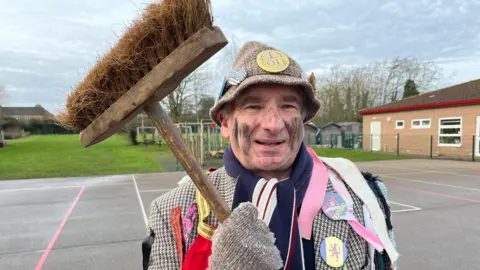 John Devine/BBC
John Devine/BBCChildren were thrilled to see an ancient tradition revived in their playground on what is known as Plough Monday.
Sutton Primary School in Cambridgeshire hosted the Mepal Molly dancers - a group of men keen to keep history alive.
Plough Monday is thought to date back centuries and gave farm labourers an opportunity to make money when the land was frozen, by busking for the gentry and land owners.
Michael Czarnobaj, the group's leader, said it was wonderful to educate children in the ways of the past.
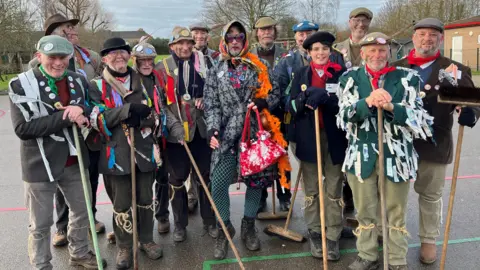 John Devine/BBC
John Devine/BBC"It's a very special day - Plough Monday," said Mr Czarnobaj.
To get a little money when the land was too frozen to farm, labourers would knock on doors and dance and sing.
"We use ceremonial brooms to sweep away the old year and bring the new one in," said Mr Czarnobaj, who has been recreating the tradition since 1977.
"We do disguise our faces, because in the old days people did not want anyone knowing that they were hard up and cadging for money, so some of us look a bit like chimney sweeps."
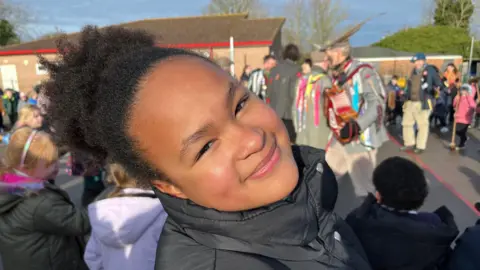 John Devine/BBC
John Devine/BBCThe spectacle took some of the school pupils by surprise, but they also seemed to enjoy learning about the tradition.
Victoria,10, said "it was amazing, but a bit weird", and admitted she might "struggle" a bit to try some of the dance moves demonstrated by the troupe.
Betsy, also 10, said it was "just really, really good" and she had never seen anything like it.
"It was all dancing and broom sweeping," she said.
Both admitted it made them feel "very jolly".
Another pupil, Koen, 10, said: "I think it was really good - because I got to have a go at it. I really like all of it."
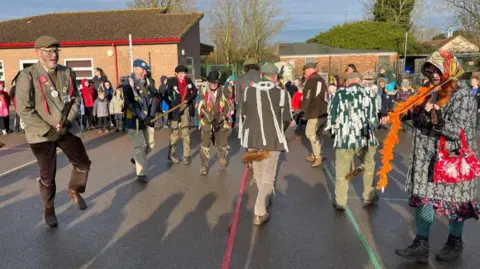 John Devine/BBC
John Devine/BBCWhat is Plough Monday?
- It is traditionally held on the first Monday after Epiphany (6 January), also known as Twelfth Night
- Workers would tour the villages with a plough, singing, dancing or sometimes parading a Straw Bear
- Householders unwilling to donate faced the threat of their gardens being ploughed up
- Workers disguised themselves in costumes and by blackening their faces with soot to prevent identification
- It was most commonly held in East Anglia and the East Midlands
Source: Calendar Customs
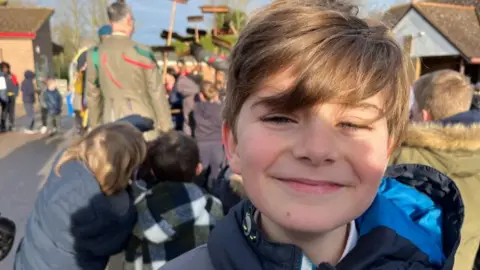 John Devine/BBC
John Devine/BBCMr Czarnobaj said the tradition "died out in 1933 in the Cambridge area" but was revived in the village of Mepal, near Ely, in 1977, and he said they had been dancing ever since.
"I like to maintain the tradition," he said.
"I think we've lost contact with the land and how our food is grown, but the land has got to be ploughed, it's got to be harrowed; we take everything for granted."
He said he was delighted to see all the children "enthralled".
The team of 14 travel around in a small bus and try to visit schools every year.
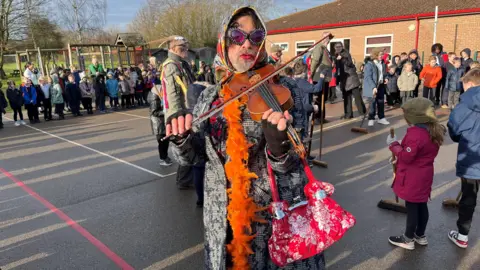 John Devine/BBC
John Devine/BBCFollow Cambridgeshire news on BBC Sounds, Facebook, Instagram and X.
